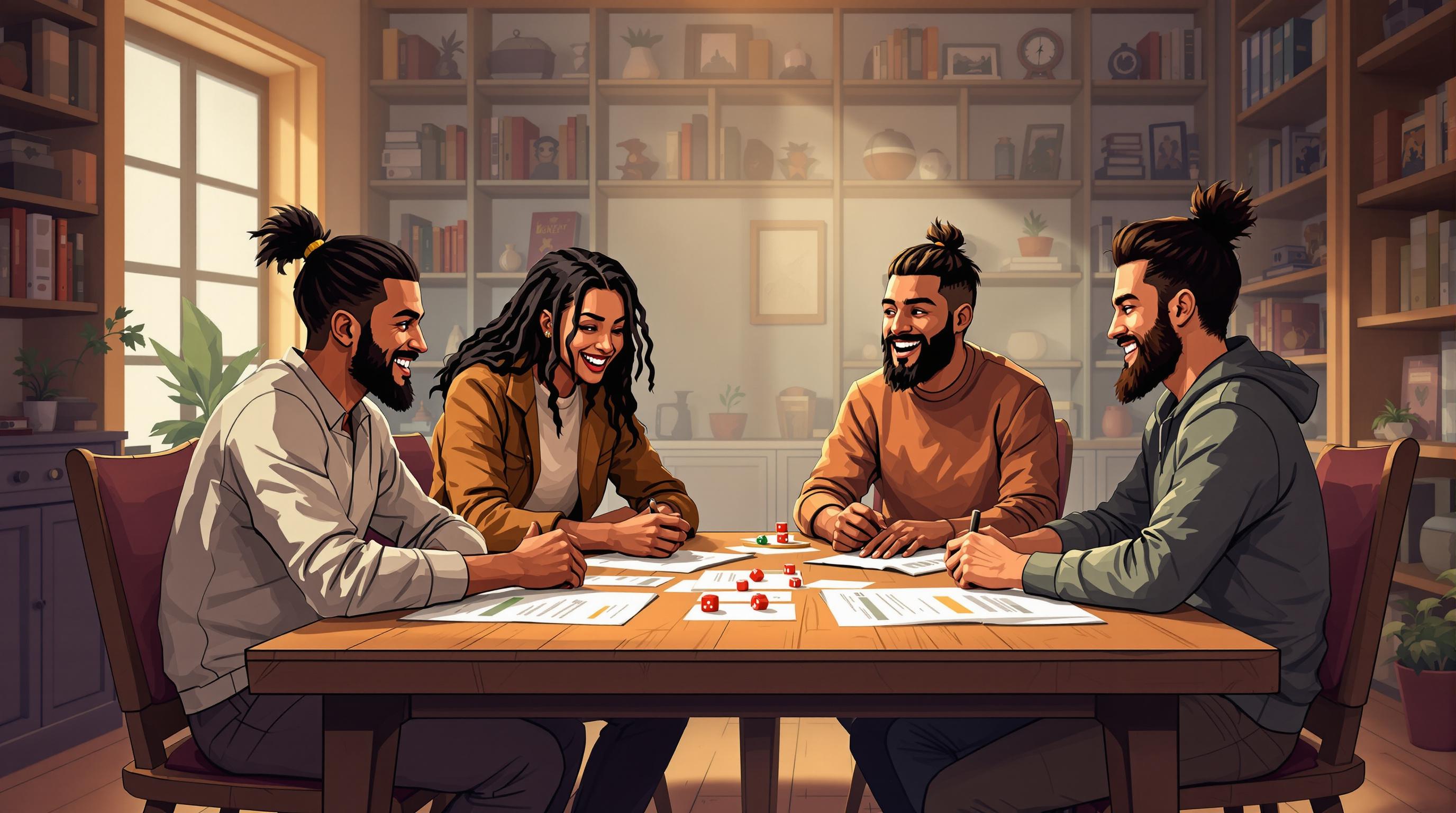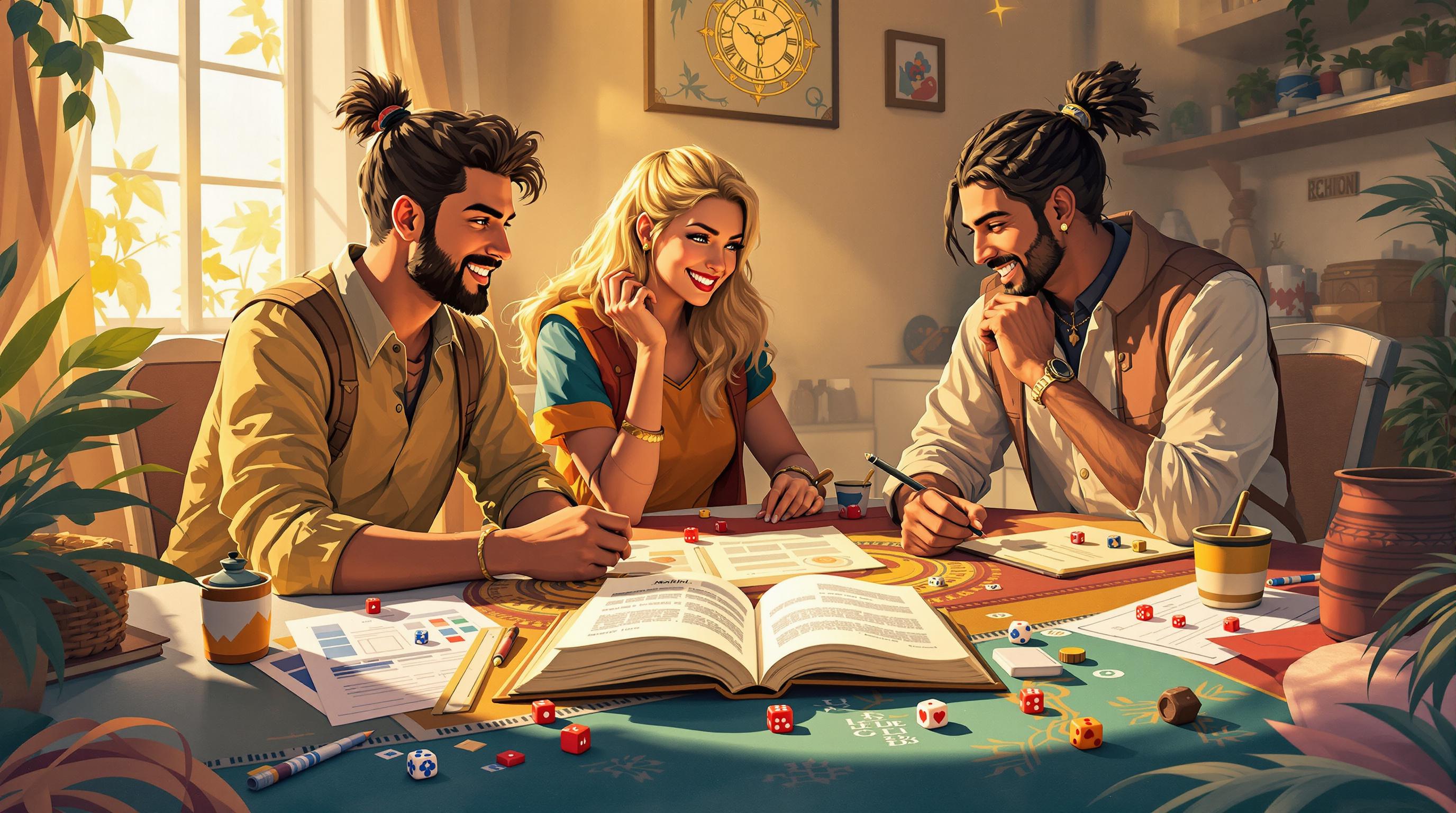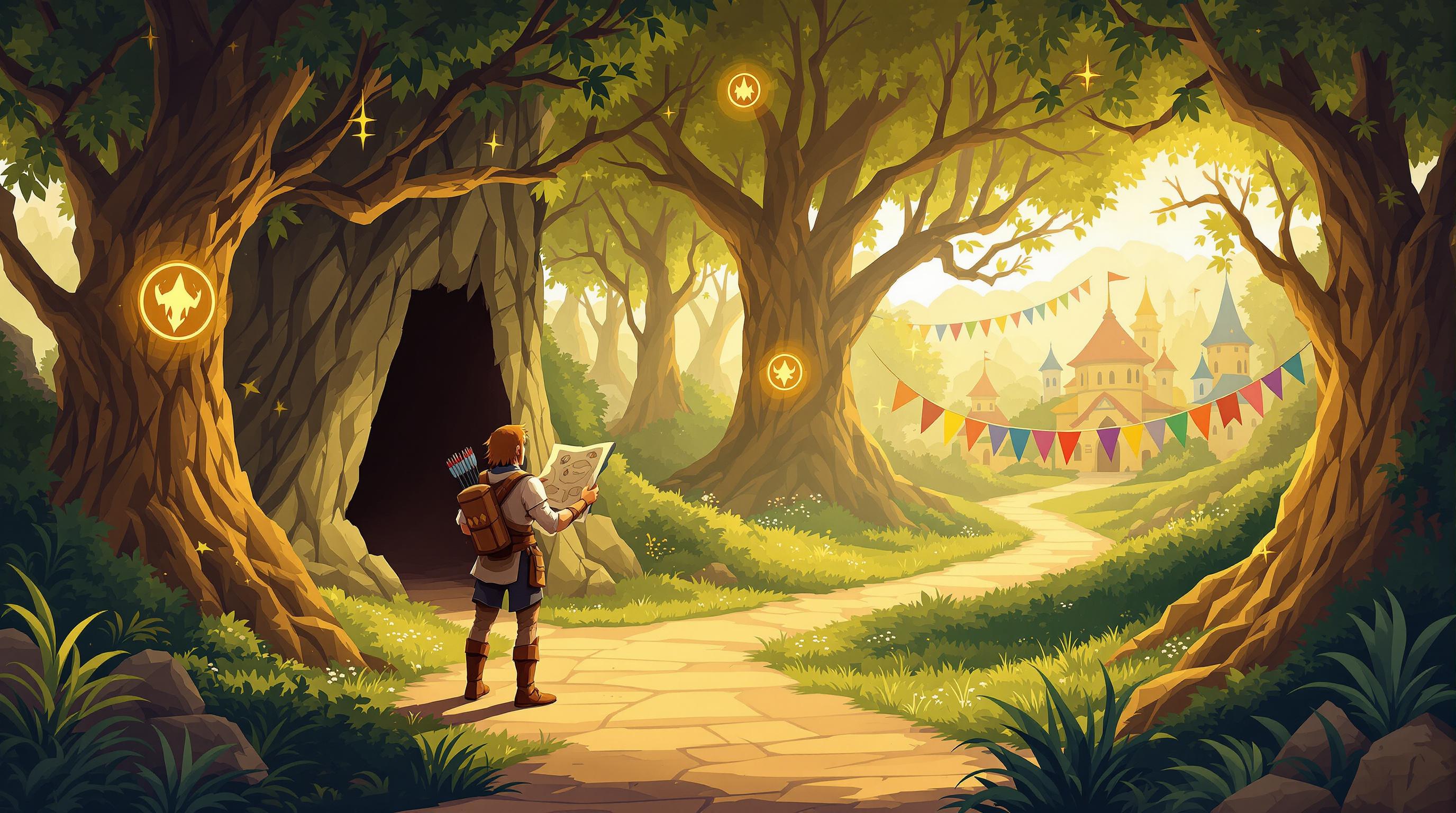Want to play tabletop RPGs by yourself? You can! Here's what you need to know:
- Solo TTRPGs let you play anytime without a group
- You control both your character and the story
- Tools like random tables and GM emulators add unpredictability
- Popular solo games: Ironsworn, Mythic, Four Against Darkness
- Key items: Dice, notebook/digital doc, GM emulator
To get started:
- Pick a beginner-friendly game (try free Ironsworn)
- Create a character with clear goals
- Use tables/emulators to guide the story
- Write down what happens as you play
- Have fun and don't worry about perfection
Solo TTRPGs offer flexible, creative storytelling you can do anytime. Give it a shot!
Related video from YouTube
Tools You Need
To play solo TTRPGs, you need tools that replace the game master and other players. Let's look at what you'll need to create your own adventures.
Game Master Tools and Random Tables
These tools help you create unexpected events and guide your story:
Mythic Game Master Emulator (GME): A 230-page PDF that costs $14.95. It uses scenes, dice rolls, and tables to create plot twists and NPC actions. One player said, "Mythic GME is one of the first aides for playing RPGs solo as we now do it, and still one of the best."
Solo Engine: Offers quests, oracles, NPCs, locations, traps, and combat foes. Great for building a detailed world as you play.
WebGM: Free, open-source tool with dice rolling and generators for names, animals, and events. The community can add to it and make it better.
RPG Solo: Has oracles for different types of games and works on mobile devices.
Use these tools to spark your imagination, not to do all the work for you. They're there to help you come up with ideas you might not think of on your own.
Paper vs Computer Tools
You can keep track of your character and game info on paper or on a computer. Both have good points:
Paper character sheets:
- Feel more real
- Easy to change or add your own stuff
- Give you that old-school gaming feel
Digital character sheets:
- Do the math for you when you make a character
- Make it easy to find and change info
- Work well with other digital tools
Many solo players use both. They might make a character on the computer, then write it down on paper to play. This way, they get the best of both worlds.
Choose based on how you like to play. If you love rolling real dice and writing things down, go with paper. If you want everything in one place, digital might be better.
Pick tools that make your game more fun, not more complicated. Try different things to see what you like, and don't be afraid to mix it up as you go along.
Picking Your Game
Let's dive into some top TTRPG systems for solo play. These games can make your lone adventures truly epic.
Best Games for Solo Play
Not all games work well for solo play. Here are some that really shine:
Ironsworn: This game's a hit with solo players. Why? It's built for it.
"Ironsworn is a favorite within the solo RPG community because of its solo-inclusive system. This baby was made for solos!" - Clare C. Marshall, author and solo RPG enthusiast
The best part? You can get the core book for free on DriveThruRPG.
Mythic: A go-to for many solo players. The Mythic Game Master Emulator (GME) is a 230-page PDF that costs $14.95. It uses scenes, dice rolls, and tables to spice up your story.
"Mythic GME is one of the first aides for playing RPGs solo as we now do it, and still one of the best." - Solo player
Four Against Darkness: Love dungeon crawls? This game's got you covered. For about $14, you'll manage a party in ever-changing dungeons. It's exploration, combat, and character growth all rolled into one.
The Wretched: Want sci-fi survival? The Wretched delivers. For $11, you're trapped on a spaceship with a nasty alien. It's tense, narrative-driven, and perfect for solo play.
When picking your game, think about:
- How well you know the rules
- How complex you want the system to be
- Whether it has tools to answer questions and throw in surprises
As Clare C. Marshall says, "The point is to use what works for you and discard the rest."
Don't be scared to try different games. You might even adapt your favorite RPG for solo play. Many folks play Dungeons & Dragons solo, using its familiar rules and tons of resources.
Whatever you choose, just start playing. Your solo adventure is waiting!
Basic Solo Play Methods
Solo tabletop RPGs let you dive into adventures on your own. Here's how to kick off your solo quests:
Using Random Tables
Random tables are your secret weapon in solo play. They spice up your story with unexpected twists and help you make decisions when you're wearing both the player and GM hats.
Here's how to make the most of random tables:
1. Stock Up on Tables
Before you start, grab a bunch of random tables. You'll want stuff like encounter generators, NPC traits, and plot twists. Many solo RPG systems come with these, but you can also find free ones online.
2. Set the Scene
Use tables to paint your world. Roll on a weather table to figure out if your character is trudging through a snowstorm or basking in sunshine.
3. Keep the Story Moving
Stuck on what happens next? Hit up a table. It could be as simple as a yes/no question or as wild as generating a whole new encounter.
4. Whip Up NPCs
Need a shopkeeper or a mysterious stranger? Random tables can give you instant personalities, motives, and looks for the characters you meet.
5. Roll with the Punches
Let the tables throw you curveballs. If a roll gives you something weird, challenge yourself to make it fit your story.
The Mythic Game Master Emulator (GME) is a popular tool for solo players. This $14.95 PDF uses scenes, dice rolls, and tables to create plot twists and NPC actions. One solo player said, "Mythic GME is one of the first aides for playing RPGs solo as we now do it, and still one of the best."
On a budget? The One Page Solo Engine is a free, lightweight GM emulator. It's perfect for newbies just dipping their toes in.
Remember, tables are there to spark your imagination, not replace it. Clare C. Marshall, a solo RPG fan and author, puts it well: "The point is to use what works for you and discard the rest."
Here's a simple yes/no table to show how it works:
| Roll 2d6 (+3 for likely, -3 for unlikely) | Answer |
|---|---|
| 2 | No, and… |
| 3-4 | No |
| 5-6 | No, but… |
| 7-9 | Yes, but… |
| 10-11 | Yes |
| 12 | Yes, and… |
Use this to make quick decisions. Wondering if your character spots a hidden door? Roll the dice and let the story unfold.
Solo RPGs are all about having fun and exploring. Feel free to talk out loud, think quietly, or switch things up as you go. The goal? Create a story that's all yours.
As you get comfy with these basics, you can try more advanced stuff or even make your own tables. The solo TTRPG world is huge - your next big adventure is just a roll away!
sbb-itb-b8b00a5
Recording Your Games
Turning your solo TTRPG adventures into captivating stories is more than just taking notes. It's about crafting a personal narrative of your character's journey. Let's dive into how you can transform your gaming sessions into engaging tales.
Game Journals: Your Adventure's Canvas
Game journals are the backbone of solo TTRPG record-keeping. They're not just logs - they're where your imagination comes to life.
Digital or Analog?
Both have their perks. One Ironsworn player shared their experience on Reddit:
"For my Ironsworn game I'm using pen+paper. I find this really nice, as I have this and everything else necessary to play (including rules summaries, maps, oracle printouts, and even dice) packed into a single plastic folder that I can take anywhere!"
Physical journals give you that tactile feel and portability. But digital tools like Google Docs or Obsidian? They make organizing and searching a breeze.
Turn Your Game into a Story
Why not write your gameplay as if it's a novel? As one solo roleplayer put it:
"I write out the whole thing as if I'm writing a story. I kinda see the resultant story as the product of playing."
This approach isn't just fun - it sharpens your storytelling skills too.
Keep It Organized
If you like structure, try this:
1. One document for game setup (character details, world info)
2. Another for the ongoing story
3. Use titles and an index bar for quick navigation
Make It Engaging
Ask yourself questions about the game as you write. Put these questions in brackets. It keeps your story flowing while exploring different possibilities.
Dice and Details Matter
Even if you're writing digitally, roll physical dice. It keeps that classic TTRPG feel alive. Jot down important rolls and outcomes - they add depth to your tale.
Stick to a System
Create a consistent format for your notes. For example:
- Brackets for questions and outcomes
- Bold text for big decisions or events
- Italics for character thoughts or emotions
This system helps you quickly spot different elements when you look back.
Building Your Campaign Archive
Over time, your game journals become a detailed record of your entire campaign. This archive is gold for:
- Keeping long-running games consistent
- Seeing how your character has grown
- Getting ideas for future adventures
Taking Solo Play Further
Want to spice up your solo TTRPG adventures? Let's explore how to create custom random tables that'll make your games pop.
Making Your Own Random Tables
Custom random tables are a solo player's secret weapon. They add flavor to your story and help you make decisions on the fly. Here's how to whip up tables that fit your style:
1. Choose Your Focus
Pick what you want to randomize. It could be character traits, plot twists, or even tavern events.
2. Brainstorm Ideas
Let your imagination go wild. Write down everything that comes to mind. Don't worry about quality yet – just get those ideas flowing.
3. Refine Your List
Time to trim the fat. Cut anything that doesn't fit your game's vibe. Aim for a mix of common and rare outcomes.
4. Organize Your Table
Arrange your ideas logically. Group similar items or create a progression from mild to wild.
5. Assign Probabilities
Decide how likely each outcome should be. Use different dice or number ranges to reflect these chances.
Here's a quick "Tavern Encounter" table example:
| Roll (d6) | Encounter |
|---|---|
| 1 | A bard sings about your recent adventures |
| 2 | Two patrons argue heatedly |
| 3 | A mysterious stranger offers you a job |
| 4 | The bartender needs help with pests |
| 5 | Adventurers invite you to join their quest |
| 6 | A bar fight erupts |
Your tables should reflect your game's unique flavor. As Clare C. Marshall, a solo RPG enthusiast and author, says: "Use what works for you and ditch the rest."
Pro Tip: Start small. Make a few tables for quests or themes. As you get comfortable, expand your collection.
Need inspiration? Check out how other solo players create their tables. One Troika campaign author shared: "For NPC tables, I combed the source text for juicy adjectives and nouns, making D366 tables that captured the game's essence."
Don't shy away from using tools to generate ideas. AI assistants can help with brainstorming, but add your own twist to the results. You can also draw from mythology, baby name lists, or random dictionary words.
As you create more tables, you'll build a toolkit that makes your solo adventures richer and more unpredictable. Keep tweaking your tables based on what works best in your games.
Summary and Next Steps
You've got the tools. Now it's time to start your solo TTRPG journey. Here's a quick recap and what to do next:
Solo TTRPGs let you play anytime, anywhere. No group needed. Game Master Emulators (GMEs) and random tables keep things unpredictable. Journaling helps you track your story and character growth.
Ready to dive in? Here's how:
1. Pick Your Game
Go for a beginner-friendly solo RPG. Ironsworn is free and perfect for solo play. It's packed with rich storytelling opportunities.
2. Get Your Gear
You'll need:
- Dice (grab a set of polyhedral dice)
- Something to write with (notebook or digital doc)
- A Game Master Emulator (like Mythic GME)
3. Build Your Character
Create a character with strong goals. It'll make your story more exciting and decisions easier.
4. Set the Scene
Find a quiet spot and set aside some time. Even 30 minutes works. Solo RPGs are flexible - play as long or short as you want.
5. Jump In
Start with action. Use your GME or random tables to shake things up. As Clare C. Marshall, solo RPG expert, says: "Use what works for you and ditch the rest."
6. Think It Over
After your first game, ask yourself: What worked? What didn't? Did you like the game system? Was journaling helpful? Tweak your approach based on what you learned.
Remember, it's all about having fun and being creative. Don't stress about perfection. You'll find your groove as you play more.
Want to explore further? Try Four Against Darkness for dungeon crawling or The Wretched for sci-fi horror. Each offers a unique solo adventure.
Now go forth and conquer your solo quests!
FAQs
How do solo journaling RPGs work?
Solo journaling RPGs are a unique twist on tabletop gaming. Here's the gist:
You use random prompts to kickstart your imagination. Then, you jot down your story in a journal. This can include notes, dialogue, and even doodles if you're feeling artsy. The game unfolds as you respond to prompts and make choices.
Take "Apothecaria" by Anna Blackwell. You're a witch running a magical pharmacy. Prompts guide you through brewing potions, chatting with customers, and digging into your character's past.
These games are usually light on rules and don't need much gear. Perfect for gaming on the go or a quiet night in.
What's the point of solo RPGs?
Solo RPGs are a unique blend of storytelling, decision-making, and imagination. Here's why people dig them:
1. Creative storytelling
You're the director of your own story. You create a world and watch it unfold based on your choices.
2. Flexibility
No need to wrangle a group. Play whenever and wherever you want.
3. Skill building
These games can sharpen your writing, problem-solving, and decision-making skills.
4. Deep dives
Many solo games let you explore specific themes or experiences in depth.
Brendan Hesse, a freelance writer, sums it up nicely:
"Like a 'regular' RPG, a solo RPG is game storytelling. It's creating a simulated world, putting characters in it, and conducting actions that progressively reveal a story organically through gameplay."
Whether you're rolling dice, flipping cards, or just following prompts, solo RPGs offer a unique way to game and tell stories on your own terms.


